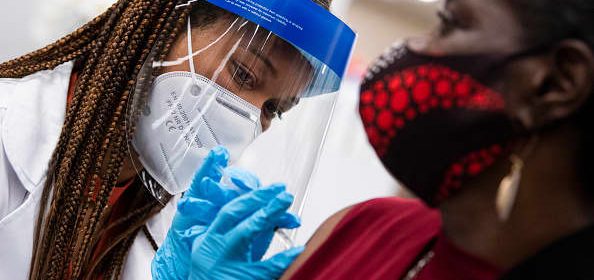Covid vaccine booster shots for all adults could be here by Thanksgiving — and new data says you should get one immediately

Covid vaccine booster shots could be on the horizon for all U.S. adults — and, according to new research, the move might be just in time.
On Tuesday, Pfizer asked the U.S. Food and Drug Administration to authorize booster shots of its Covid-19 vaccine for all Americans age 18 and older. The FDA could approve the request before Thanksgiving, according to the New York Times.
Moderna is expected to submit a similar request to the FDA "soon," the Times noted. Any new batch of eligibility would still need to be cleared by the Centers for Disease Control and Prevention before becoming official.
If the FDA and CDC approve Pfizer's request, every U.S. adult who's currently fully vaccinated — more than 181 million of them — will become booster-eligible. Currently, the only people who can get booster shots are:
- those ages 65 and older
- adults with a high risk of exposure to Covid, due to their jobs or living situations
- adults with certain underlying medical conditions that put them at risk of severe illness from Covid
- anyone who got Johnson & Johnson's one-shot vaccine
Nearly 25 million U.S. adults have gotten a Covid vaccine booster shot so far, according to CDC data.
In September, an FDA advisory group actually voted against authorizing boosters for people ages 16 and up. At the time, experts said, two doses of the mRNA Covid vaccines still provided sufficient protection against severe hospitalization and death for young, healthy Americans.
But now, an influx of new data points to benefits of widespread boosters, Christopher Mores, a global health professor at the George Washington University Milken Institute School of Public Health, tells CNBC Make It.
Here's why, and whether or not getting that booster shot — once you're eligible — is a good idea.
Why Covid vaccine booster shots are more important now than they were in September
The initial rationale for distributing booster shots was simple: Some people needed additional protection against Covid to prevent hospitalizations and deaths, but most didn't. For the majority of fully vaccinated people, getting Covid meant extremely mild symptoms, or no symptoms at all.
That calculus has changed, says Dr. Colleen Kelley, an associate professor of medicine in the division of infectious diseases at Emory University School of Medicine. The virus that causes Covid continues to spread, due largely to millions of people who remain unvaccinated, and vaccine protection is waning more significantly over time than experts expected two months ago.
That means the odds of breakthrough infections in fully vaccinated people — with potentially serious symptoms — are increasing. Booster shots, Kelley says, can increase antibody levels enough to help prevent those infections and return any breakthrough symptoms to a mild or nonexistent state.
Last month, an Israeli study on 4.8 million vaccinated adults compared the rates of breakthrough infections in people four to six months after becoming fully vaccinated. At six months, the rate nearly doubled to 3.3 cases per 1,000 people — up from just 1.7 at four months.
"While the Delta variant surely has played a role in the resurgence of Covid-19 in recent months, these findings suggest that waning immunity also is an important factor," National Institutes of Health director Dr. Francis Collins wrote in a blog post on Tuesday about the Israeli study.
Similarly, a large study on Covid vaccines in U.S. veterans published last week found that for all three of the country's approved options, protection waned significantly in people who'd been fully vaccinated for six months — down to 48.1%, from an initial 87.9%. All three vaccines, the study noted, remain very effective at preventing death.
"Boosters have a role there to pick that up, and not allow so much breakthrough to occur," Mores says.
Why you should consider getting a booster as soon as you're eligible
Everyone's individual health and risk profile is different, so consider consulting with your doctor before proceeding — but generally speaking, most people should get a booster shot once eligible. It's a low-risk, high-reward choice, experts say.
"There's no indication that there's something inherently risky about obtaining a booster of this vaccine," Mores says. "There is certainly something inherently risky about becoming infected with Covid."
You should especially plan for a booster shot if you want to be indoors with other people during the winter months, or travel over the holidays, says Dr. Sadiya Khan, assistant professor of medicine at Northwestern University Feinberg School of Medicine.
The bigger question may be which booster to get. Anyone who's eligible can get a booster dose of any of the country's three authorized vaccines, regardless of which one they initially received.
Adult women younger than 50 should consider an mRNA booster from either Pfizer or Moderna, says Dr. William Schaffner, Vanderbilt University professor of medicine in the division of infectious diseases. That's because J&J's vaccine can, in rare instances, lead to blood-clotting disorders for that demographic.
Similarly, both mRNA vaccines have become associated with increased rates of myocarditis, or inflammation of the heart, particularly among younger men — but Kelley says such cases are very rare, extremely mild and fairly easy to manage.
"It's really important to think about the booster as a way to more safely return to normal life," Khan says. "That's really the goal here: not to keep living in a pandemic world, but to try to move past that."
Sign up now: Get smarter about your money and career with our weekly newsletter
Don't miss:
Mix-and-match Covid vaccine boosters are here — How to choose the best one for you
Source: Read Full Article
